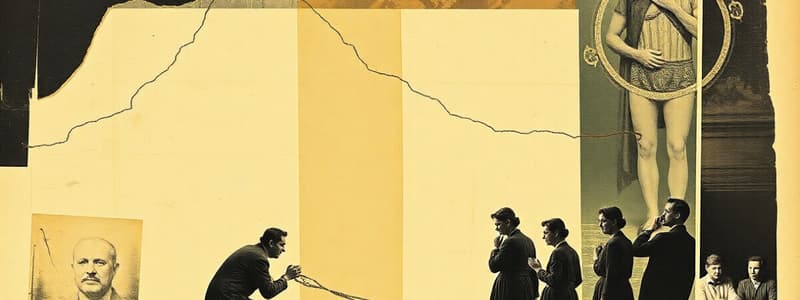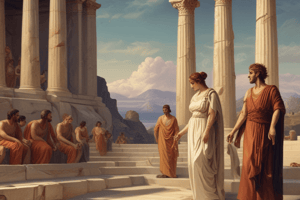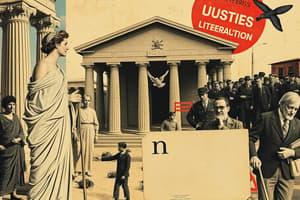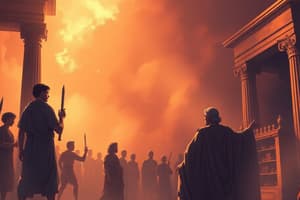Podcast
Questions and Answers
Which element of stagecraft most directly contributes to creating the mood and atmosphere of a play?
Which element of stagecraft most directly contributes to creating the mood and atmosphere of a play?
- Lighting design (correct)
- Costume design
- Set design
- Sound design
In a play about a family struggling with poverty, which dramatic style would most likely be used to realistically depict their daily lives?
In a play about a family struggling with poverty, which dramatic style would most likely be used to realistically depict their daily lives?
- Romanticism
- Absurdism
- Expressionism
- Realism (correct)
A character delivers a long speech expressing inner turmoil while alone on stage. Which dramatic technique is being employed?
A character delivers a long speech expressing inner turmoil while alone on stage. Which dramatic technique is being employed?
- Soliloquy (correct)
- Aside
- Monologue
- Dramatic Irony
Which playwright is best known for plays that critique societal norms with sharp wit and intellectual arguments?
Which playwright is best known for plays that critique societal norms with sharp wit and intellectual arguments?
In a suspenseful scene, the audience knows that a villain is hiding in the next room, but the character on stage is unaware. What dramatic technique is being used?
In a suspenseful scene, the audience knows that a villain is hiding in the next room, but the character on stage is unaware. What dramatic technique is being used?
Which dramatic style is characterized by the deliberate distortion and exaggeration of reality to convey intense emotional experiences?
Which dramatic style is characterized by the deliberate distortion and exaggeration of reality to convey intense emotional experiences?
A play concludes with a sudden, unexpected rescue by a previously unmentioned character, resolving all conflicts. Which dramatic device is the playwright employing?
A play concludes with a sudden, unexpected rescue by a previously unmentioned character, resolving all conflicts. Which dramatic device is the playwright employing?
Which playwright is famous for exploring themes of alienation, meaninglessness, and the futility of communication in works that often defy conventional narrative structures?
Which playwright is famous for exploring themes of alienation, meaninglessness, and the futility of communication in works that often defy conventional narrative structures?
Which of the following best describes the evolution of drama from its origins?
Which of the following best describes the evolution of drama from its origins?
In the structure of a typical play, what is the primary function of the rising action?
In the structure of a typical play, what is the primary function of the rising action?
Which genre is characterized by exaggerated situations, slapstick, and improbable events for humorous effect?
Which genre is characterized by exaggerated situations, slapstick, and improbable events for humorous effect?
If a play aims to expose and criticize follies and shortcomings in society through humor, which genre does it likely belong to?
If a play aims to expose and criticize follies and shortcomings in society through humor, which genre does it likely belong to?
Which element of drama encompasses the visual aspects of a play, including costumes, scenery, and lighting?
Which element of drama encompasses the visual aspects of a play, including costumes, scenery, and lighting?
A play explores the theme of morality. In which part of the play's structure would this theme be most evident as the main characters grapple with difficult choices?
A play explores the theme of morality. In which part of the play's structure would this theme be most evident as the main characters grapple with difficult choices?
Which playwright is credited as the first actor to step out of the chorus in ancient Greek drama?
Which playwright is credited as the first actor to step out of the chorus in ancient Greek drama?
How do acts and scenes typically function within the structure of a play?
How do acts and scenes typically function within the structure of a play?
Flashcards
Drama
Drama
Fictional representation through dialogue and performance.
Origin of 'Drama'
Origin of 'Drama'
Comes from the Greek word 'drâma', meaning 'action'.
Earliest origins of drama
Earliest origins of drama
Athens, evolved from religious rituals celebrating Dionysus.
Exposition
Exposition
Introduces characters, setting, and initial conflict.
Signup and view all the flashcards
Climax
Climax
Point of highest tension in a play.
Signup and view all the flashcards
Comedy
Comedy
Aims to amuse through humor and lighthearted situations.
Signup and view all the flashcards
Farce
Farce
Exaggerated situations and improbable events for humor.
Signup and view all the flashcards
Plot
Plot
Sequence of events that make up the story.
Signup and view all the flashcards
Stagecraft
Stagecraft
The technical elements of a theatre production, like sets and lighting.
Signup and view all the flashcards
Dramatic Irony
Dramatic Irony
When the audience knows something the characters don't.
Signup and view all the flashcards
Aside
Aside
A character's speech to the audience, other characters can't hear.
Signup and view all the flashcards
Soliloquy
Soliloquy
A character alone on stage speaks their thoughts aloud.
Signup and view all the flashcards
Monologue
Monologue
A long speech by one character.
Signup and view all the flashcards
Realism
Realism
Life as it is, without idealizing.
Signup and view all the flashcards
Naturalism
Naturalism
Emphasizes the impact of social and environmental forces.
Signup and view all the flashcards
Expressionism
Expressionism
Expresses emotions through distortion and exaggeration.
Signup and view all the flashcardsStudy Notes
- Drama is a mode of fictional representation through dialogue and performance.
- It is one of the literary arts and often overlaps with theatrical performance.
Origins
- The word "drama" comes from the Greek word "δρᾶμα" (drâma), meaning "action".
- The earliest origins of drama are to be found in Athens where theatrical performances evolved out of religious rituals.
- These rituals celebrated Dionysus, the god of wine and fertility.
- Early drama was choral, with a chorus of performers singing and dancing.
- Over time, individual actors emerged from the chorus, leading to dialogue and character development.
- Thespis is credited with being the first actor to step out of the chorus.
- Key playwrights of ancient Greece include: Aeschylus, Sophocles, Euripides, and Aristophanes.
Structure
- A play is typically divided into acts, which are further divided into scenes.
- Acts indicate a significant shift in the plot or setting.
- Scenes usually represent a continuous time and place.
- Dramatic action usually follows a structure that includes exposition, rising action, climax, falling action, and resolution (denouement).
- Exposition introduces the characters, setting, and initial conflict.
- Rising action builds tension through a series of events.
- The climax is the point of highest tension.
- Falling action shows the consequences of the climax.
- Resolution resolves the conflict.
Genres
- Tragedy: Tragedy deals with serious and universal themes like suffering, morality, and the conflict between individual will and fate.
- Comedy: Comedy aims to amuse the audience through humor, satire, and lighthearted situations.
- Satire: Satire uses humor to expose and criticize follies, vices, and shortcomings in individuals or society.
- Farce: Farce relies on exaggerated situations, slapstick, and improbable events for humorous effect.
- Tragicomedy: Tragicomedy blends elements of both tragedy and comedy.
- Melodrama: Melodrama emphasizes exaggerated emotions and sensational events to create a strong emotional response from the audience.
- Historical drama: Historical drama is based on historical events and figures.
- Musical theatre: Musical theatre combines music, songs, spoken dialogue, and dance.
Elements of Drama
- Plot: The sequence of events that make up the story.
- Character: The individuals who participate in the action of the play.
- Dialogue: The conversation between characters.
- Spectacle: The visual elements of a play, including costumes, scenery, lighting, and special effects.
- Theme: The central idea or message of the play.
- Music/Rhythm: In some forms of drama, music and rhythm play a significant role.
- Stagecraft: The technical aspects of theatrical production including set design, lighting, sound, and costume.
- Acting: The art of embodying and performing a character.
- Directing: The art of guiding and shaping the performance to realize the play's vision.
Dramatic Techniques
- Dramatic Irony: The audience knows something that the characters do not.
- Aside: A character speaks directly to the audience, unheard by other characters on stage.
- Soliloquy: A character speaks their thoughts aloud, usually when alone on stage.
- Monologue: A long speech by a single character.
- Deus ex machina: A plot device whereby a seemingly unsolvable problem is suddenly and abruptly resolved by the unexpected intervention of some new event, character, ability or object.
Styles
- Realism: Realism seeks to depict life as it is, without idealization or romanticism.
- Naturalism: Naturalism is an extreme form of realism, emphasizing the influence of social and environmental forces on human behavior.
- Expressionism: Expressionism seeks to express subjective emotions and experiences through distorted and exaggerated means
- Absurdism: Absurdism explores the meaninglessness and irrationality of human existence.
Key Playwrights (Beyond the Greeks)
- William Shakespeare: Considered one of the most influential playwrights of all time, known for tragedies, comedies, and histories.
- Henrik Ibsen: A major figure in the development of modern realism.
- Anton Chekhov: Known for his realistic and character-driven plays.
- George Bernard Shaw: A master of wit and social commentary.
- Arthur Miller: Explored social and political themes.
- Tennessee Williams: Known for his poetic language and exploration of human desire.
- Eugene O'Neill: Explored dark and tragic themes.
- Samuel Beckett: A key figure in absurdist drama.
- Harold Pinter: Known for his use of pauses, ambiguity, and power dynamics.
- Caryl Churchill: A contemporary playwright known for her innovative and experimental works.
Dramatic Criticism
- Dramatic criticism involves analyzing and evaluating plays and theatrical performances.
- Different critical approaches can be used, such as analyzing the play's structure, themes, characters, language, and historical context.
Influence
- Drama has had a profound influence on literature, film, television, and other art forms.
- Dramatic techniques and conventions are used in various storytelling mediums to create engaging and meaningful experiences.
Studying That Suits You
Use AI to generate personalized quizzes and flashcards to suit your learning preferences.




